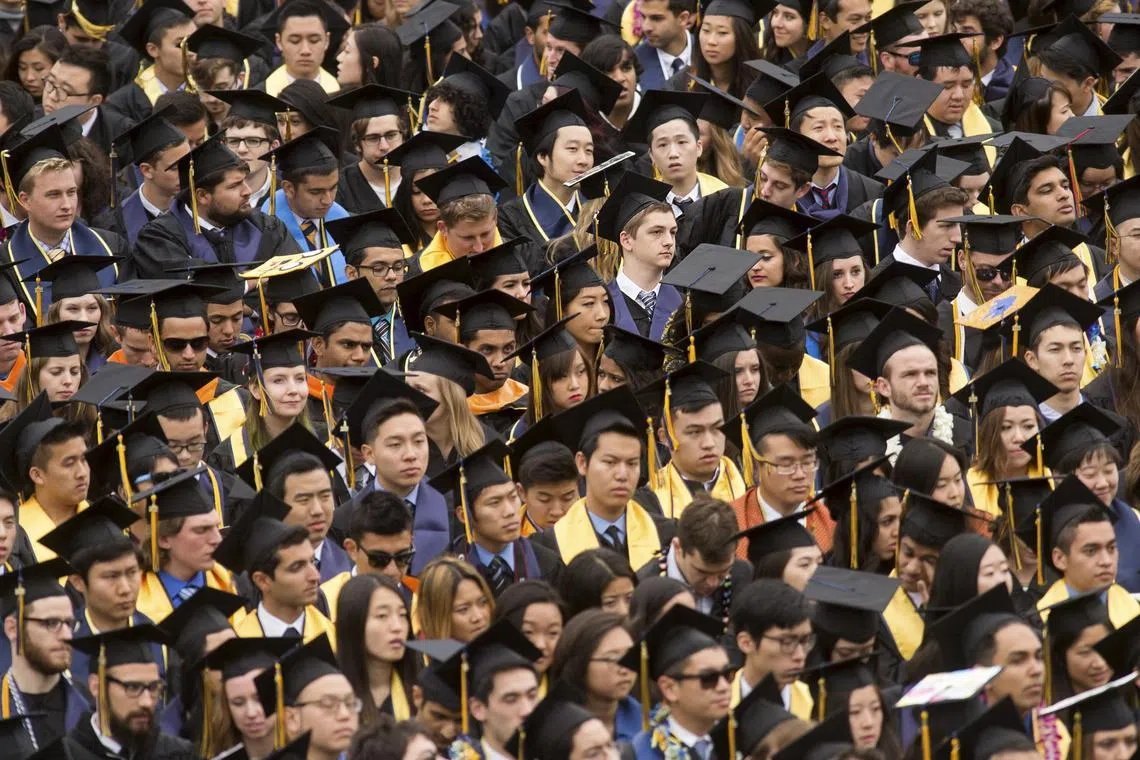Foreign students in US mount court challenges as Trump ends their legal status
Sign up now: Get ST's newsletters delivered to your inbox

The federal government revoked the students’ status by removing them from a database of the approximately 1.1 million foreign student visa holders.
PHOTO: REUTERS
Follow topic:
BOSTON – International students are rushing to ask US judges to block immigration officials from deporting them after President Donald Trump’s administration began revoking the rights of thousands of student visa holders to remain in the country.
On April 15 alone, judges in at least seven states including Massachusetts, Montana and Wisconsin as well as Washington, issued emergency orders barring the immigration authorities from acting against students after the government cancelled their legal basis for being in the US, part of Mr Trump’s broad immigration crackdown.
“This is popping up all over the country,” US District Judge Patti Saris in Boston said during a hearing on April 15 at which she blocked the authorities from arresting a 22-year-old Chinese student at the Massachusetts Institute of Technology (MIT), who is weeks away from earning her degree.
The federal government revoked the students’ status by removing them from a database of the approximately 1.1 million foreign student visa holders, putting them at risk of deportation.
The database monitors compliance with visa terms and records foreign students’ addresses, progress towards graduation and other information. To remain in the database, student visa holders have to obey conditions like limits on employment and avoiding illegal activity.
Since Mr Trump took office on Jan 20, more than 4,700 students have been deleted from the US Immigration and Customs Enforcement-maintained database known as Student and Exchange Visitor Information Systems, according to the American Immigration Lawyers Association.
The Chinese student at MIT, referred to in court only as Jane Doe, is one of nine that the university said had their visas and immigration status unexpectedly revoked in April, a phenomenon repeating at colleges nationally.
The Department of Homeland Security, which oversees Immigration and Customs Enforcement (ICE) and the database, did not respond to requests for comment.
But in court filings, the administration said it can end students’ eligibility to be in the US if they, for example, turn up in a criminal history search.
By statute, criminal activity is defined as instances in which student visa holders are convicted of violent crimes for which a sentence of more than one year could be imposed.
Yet many of the students who have sued say they had their status revoked based on criminal record searches that found dismissed charges or minor offences.
Mr Krish Isserdasani, a 21-year-old undergraduate at the University of Wisconsin-Madison from India, is among them.
He acknowledged that while walking home from a bar in November 2024, he was arrested for disorderly conduct after a verbal argument.
The local district attorney declined to pursue charges against Mr Isserdasani. But on April 4, his university informed him that his database record had been terminated. A federal judge in Wisconsin ruled on April 15 that the government’s action was likely unlawful.
“So far, defendants have offered nothing to suggest Isserdasani is undeserving of a degree after years of effort and payment of tuition, much less should be deported from the United States before completing his degree,” US District Judge William Conley wrote.
Safeguards ‘blown past’
In Montana, US District Judge Dana Christensen reached a similar conclusion that same day. He issued a temporary restraining order requiring the government to restore the legal status of two Montana State University students, one from Iran and one from Turkey.
The judge said neither student had been convicted of any crime, nor had either been active in on-campus political protests.
The US Constitution guarantees freedom of speech for everyone in the US, regardless of immigration status. But there have been high-profile instances of the administration revoking visas of students who advocated against Israel’s war in Gaza.
Mr Jonathan Wasden, a lawyer at Wasden Immigration Litigation, said in the hundreds of cases he has seen so far, “every procedural safeguard in the book was blown past”.
Most involve students whose visas were revoked for minor traffic offences, and in some cases, there was no clear reason, he added. Yet many students are trying to keep a low profile and avoid litigation, he said.
“A lot of people are scared that filing suit will put them on ICE’s radar, and they don’t want to be the next guy on CNN being surrounded by ICE agents sporting balaclavas and handcuffs,” he said.
Among the most widely publicised of such arrests was one captured on video in March of masked agents taking a Tufts University student from Turkey into custody.
Nevertheless, lawsuits continue to mount. Local affiliates of the American Civil Liberties Union (ACLU) have filed at least three so far, including a case in New Hampshire, where a judge last week ordered a Dartmouth College student’s immigration status restored.
Lawyers at the ACLU of Michigan on April 15 urged a judge to halt moves against four students at the University of Michigan and Wayne State University, while the civil rights group’s Indiana affiliate sued that day on behalf of seven international students at schools there.
“The impact on these students’ lives is profound, and now they live in fear of being deported at any moment,” said Mr Ken Falk, a lawyer with the ACLU of Indiana. REUTERS

